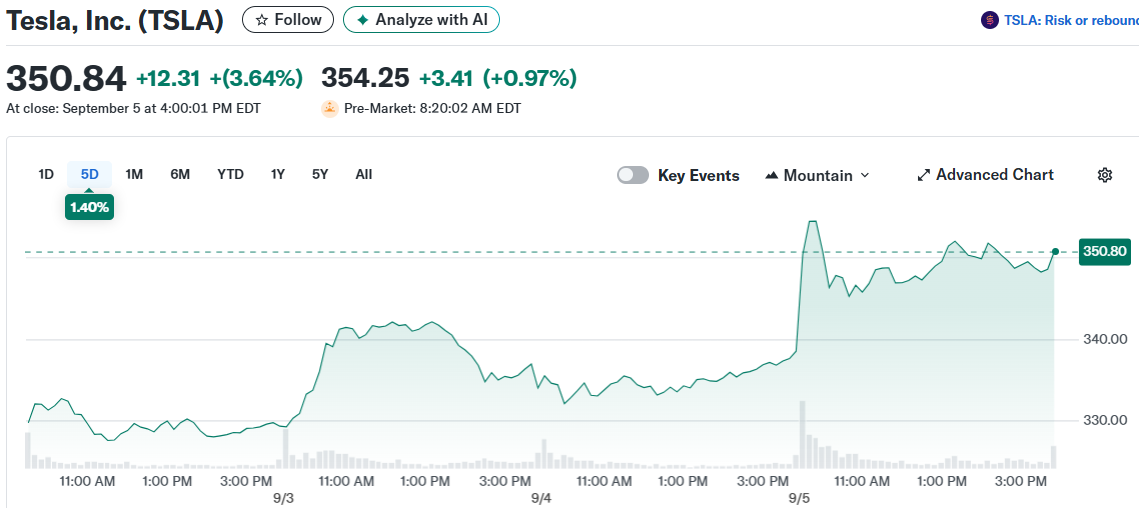Tesla (TSLA) Stock: Market Share Plunges to Eight-Year Low as Competition Intensifies
TLDR
- Tesla’s US EV market share dropped to 38% in August, lowest since 2017
- Competitors like Hyundai and Volkswagen are gaining with better incentives
- Tesla sales grew only 3.1% while overall EV market expanded 14%
- Company focusing on robotaxis rather than new affordable car models
- Board proposed $1 trillion pay package for Musk tied to ambitious growth targets
Tesla’s dominance in the US electric vehicle market is cracking. The EV pioneer’s market share fell to 38% in August, the first time below 40% since October 2017.
This decline comes as traditional automakers flood the market with new electric models and attractive deals. While Tesla managed 3.1% growth in August, the broader EV market surged 14%.

Tesla once commanded over 80% of US EV sales. Now it’s watching competitors chip away at its lead with zero-interest financing and free charging offers.
Rivals Win with Better Deals
Competitors are stealing Tesla customers with superior incentives. Hyundai, Toyota, and Kia boosted their EV sales between 60% and 120% in July by offering better deals than Tesla.
Volkswagen saw explosive 450% monthly sales growth in July. The German automaker is luring buyers with attractive lease prices and complimentary fast-charging packages.
One Bay Area buyer chose a Volkswagen ID.4 over Tesla’s Model Y after being offered an irresistible deal. Traditional automakers are capitalizing on urgency around federal tax credits expiring.
Tesla faces a painful choice: slash prices to boost sales or protect margins while losing market share. Current data suggests the company is struggling with both objectives.
Focus Shifts Away from Cars
Tesla has pivoted toward robotaxis and humanoid robots instead of developing new affordable vehicles. This strategic shift comes precisely when competitors are launching fresh models.
The company’s last new car was the 2023 Cybertruck, which hasn’t replicated the success of the Model 3 or Model Y. Even the refreshed Model Y failed to generate expected excitement.
Tesla is heading toward a second consecutive year of declining sales. Industry experts warn that without new products, market share will continue eroding.
The company’s board recently proposed an unprecedented $1 trillion compensation package for CEO Elon Musk. The deal requires Tesla to reach $8.5 trillion in market value within a decade.
Market Data Shows Continued Decline
July data revealed Tesla’s market share dropped to 42% from 48.7% in June, the steepest decline since March 2021. August preliminary figures confirm the downward trend continues.
Cox Automotive data shows competitors are successfully executing their EV strategies. Traditional automakers benefit from dealer networks and established customer relationships.
Tesla’s pricing power has weakened as competition intensifies. The company must balance profitability against market share preservation in an increasingly crowded field.
Recent sales figures indicate Tesla sold 53,816 vehicles in July, representing modest growth while rivals posted explosive gains across multiple brands and models.





